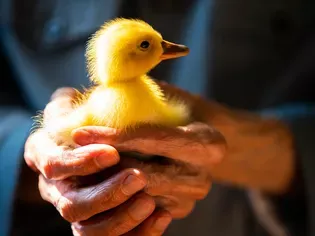Everything You Need to Know About Keeping a Duck as a Pet
Updated on 04/26/24

Embark on a Feathery Adventure: The Ultimate Guide to Keeping Ducks as Pets
Prepare to be captivated by the charming and inquisitive nature of ducks as you embark on a delightful journey as a proud duck parent. From their quirky personalities to their adorable habits, these feathered companions will undoubtedly bring an abundance of joy and entertainment into your life. However, before welcoming these delightful creatures into your home, it's crucial to equip yourself with the essential knowledge to ensure their well-being and happiness.
Understanding the Unique Needs of Your Duck
1. Accommodations: Ducks thrive in environments that cater to their natural instincts. A spacious coop with ample room to roam and a separate nesting box for privacy is essential. The coop should be well-ventilated, draft-free, and protected from predators. Ensure a clean and dry environment by regularly removing droppings and providing fresh bedding.
2. Diet: A balanced diet is vital for your duck's health. Commercial duck feed, supplemented with fresh fruits, vegetables, and greens, provides a nutritious foundation. Avoid feeding your duck table scraps or processed foods, as these can be harmful. Access to clean water is essential for hydration and digestion.
3. Exercise and Enrichment: Ducks are active creatures that require regular exercise to stay healthy and happy. Providing a large enclosure or allowing them to roam in a safe outdoor area is crucial. Offer enrichment activities such as toys, water features, or opportunities to forage for natural treats to stimulate their minds and prevent boredom.
4. Health and Veterinary Care: Like any other pet, ducks require regular veterinary checkups and vaccinations to stay healthy. Signs of illness include lethargy, decreased appetite, nasal discharge, or changes in behavior. Contact your veterinarian immediately if you notice any concerning symptoms. Proper hygiene practices, such as regular cleaning and disinfecting of their living space, help prevent the spread of disease.
Creating a Harmonious Environment
1. Companionship: Ducks are sociable animals that enjoy the company of their own kind. If you can, keep at least a pair of ducks to prevent loneliness and encourage natural behaviors. Ducks of different breeds can coexist peacefully, creating a diverse and entertaining flock.
2. Training and Handling: While ducks may not be as trainable as dogs or cats, they can learn basic commands with patience and positive reinforcement. Start training at a young age and keep sessions short and rewarding. Handle your ducks gently and respect their personal space to build a strong bond.
3. Special Considerations: Be aware of potential challenges associated with keeping ducks as pets. They can be messy and noisy, and their droppings can attract pests. Make sure your neighbors are aware of your feathered friends and take steps to minimize any potential disturbances.
Examples of Enriching Activities for Your Duck
* Water Play: Ducks love to splash and play in water. Provide a shallow pool or kiddie pool filled with clean water for them to enjoy.
* Foraging: Hide treats or scatter food in their enclosure to encourage natural foraging behavior. This stimulates their minds and provides entertainment.
* Interactive Toys: Ducks enjoy playing with toys such as floating balls, rubber duckies, or puzzle feeders that challenge their cognitive abilities.
* Socialization: Allow your ducks to interact with other ducks outside their flock in a safe and controlled environment. This promotes socialization and helps prevent boredom.
* Training: Train your ducks simple commands such as "come" or "treat" using positive reinforcement. This strengthens your bond and provides mental stimulation.
Conclusion
Keeping a duck as a pet can be an incredibly rewarding experience. By providing a nurturing and stimulating environment, understanding their unique needs, and creating opportunities for enrichment, you can ensure your feathered companion lives a long, happy, and fulfilling life. Embrace the joy and companionship that these charming creatures bring into your life and embark on an unforgettable adventure as a duck parent!
Explore More Pets

Small Bird Breeds
Gloster Canary: Bird Species Profile

Small Bird Breeds
Java Finch: Bird Species Profile

Small Bird Breeds
Zebra Finch (Chestnut-Eared Finch): Bird Species Profile

Small Bird Breeds
Alexandrine Parakeet: Species Characteristics & Care

Small Bird Breeds
Canary: Bird Species Profile

Small Bird Breeds
Lovebird (Pocket Parrot) Species Profile

Small Bird Breeds
A Guide to Pet Budgie Birds

Small Bird Breeds
Types of Small Parrots